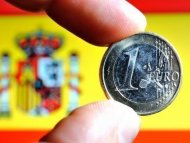 Group of 20 leaders focused their response to Europe's financial crisis on stabilizing the region's banks, raising pressure on German Chancellor Angela Merkel to expand rescue measures as contagion engulfed Spain.
Group of 20 leaders focused their response to Europe's financial crisis on stabilizing the region's banks, raising pressure on German Chancellor Angela Merkel to expand rescue measures as contagion engulfed Spain.As U.S. President Barack Obama called after-dinner talks with euro-area leaders at the G-20 summit in Mexico, the Treasury department's top international negotiator, Lael Brainard, said Europe is making an effort to "break the feedback loop" between banks and government debt, the link that is worsening Spain's woes.
"We're seeing a notable shift in European discussion" toward spurring economic growth and "laying out a path to financial union," Brainard told reporters as the two-day summit began at the resort of Los Cabos.
G-20 chiefs met as Spain's borrowing costs soared to a euro-era record and elections in Greece failed to damp the threat of contagion. Merkel, who heads Europe's largest economy and rejects pooling euro-area debt or boosting deficit spending, said she'll defend her policies with "good arguments" as world leaders press Europe to stamp out the debt crisis now in its third year. Obama has blamed the crisis for slowing U.S. employment growth.
The euro-area's G-20 governments -- Germany, France and Italy will commit to protecting the currency union, according to an excerpt of a draft of the statement that leaders will issue at the end of the summit.
Integrity, StabilityEuro-area members "will take all necessary policy measures to safeguard the integrity and stability of the area, improve financial markets and break the feedback loop between sovereigns and banks," according to the draft provided by an official from a G-20 government who declined to be identified because the statement is not yet public.
With European Union leaders preparing to discuss paths to closer political and economic union at a summit in Brussels on June 28-29, Merkel has distanced herself from aspects of the EU's proposal for a banking union. She said last week that steps such as jointly insuring deposits and joint euro-area bonds can't replace budget discipline and raising competitiveness across the euro area.
"It's not a complete beating up session, but Germany is the recipient of fairly caustic criticism from other members of the G-20," Rob Carnell, chief international economist at ING Bank NV in London, said by telephone. "The pressure will be on Germany to give more ground and behind closed doors Merkel may well be more accommodative."
IMF ResourcesAs part of the crisis toolkit, the world's largest emerging economies are announcing contributions to the International Monetary Fund's financial firewall at the meeting, beginning with $10 billion pledges from both Russia and India. Brazil's Finance Minister Guido Mantega said He called for a "change of direction" in crisis-fighting, saying that the antidote "goes beyond the measures that are being adopted" by Europe.
"There is concern that the firewall available may not be adequate to deal with contagion," said Indian Prime Minister Manmohan Singh. "The resources currently expected to be mobilized by Europe and the IMF are less than was estimated a year ago, and the crisis is actually more serious."
The euro extended a decline yesterday, falling 0.5 percent to $1.2576, as Spanish 10-year bond yields leapt above the 7 percent level that forced Greece, Ireland and Portugal to call for sovereign rescues. That stoked speculation that Spain may need to call for a sovereign bailout after the government called for as much as 100 billion euros ($126 billion) to shore up its blighted banks.
ECB ActionThe European Central Bank can stop the debt crisis in the 17-nation euro region "almost immediately" with "massive" government-bond purchases, Guillermo Ortiz, the chairman of Grupo Financiero Banorte SAB and Mexico's former central bank governor, said in an interview in Los Cabos. The ECB "has done quite a bit," Ortiz said. "The problem is it needs to do more."
G-20 leaders are in Los Cabos for their second consecutive summit to be dominated by the crisis. Spain's Prime Minister Mariano Rajoy is also attending the talks, as the respite in markets after a victory for the pro-bailout New Democracy party in Greek elections on June 17 proved short-lived.
Merkel damped speculation that the terms of Greece's bailout might be relaxed.
"The important thing is that the new government sticks with the commitments that have been made," Merkel told reporters. "There can be no loosening on these reform steps."
China, IndonesiaChina and Indonesia set the tone of the meeting by signaling growing exasperation with more than two years of European crisis-fighting that has failed to stem the threat of global contagion.
Even as Obama said that now is the time "to make sure that all of us do what's necessary to stabilize the world financial system," European leaders pushed back, saying they alone are not responsible for the slowing global recovery.
No one thinks the EU "is the only source of the problem," said Italian Prime Minister Mario Monti. The crisis "had its origins in imbalances in other countries, including the U.S."
EU Commission President Jose Manuel Barroso, challenged at a press briefing in Mexico on Europe's credibility during the crisis, said its leaders had "not come here to receive lessons in terms of democracy or in terms of how to handle the economy."
Merkel, Monti, Rajoy and French President Francois Hollande, the heads of the four biggest euro economies, next meet in Rome on June 22, before the full EU summit in Brussels.
Leaders will pledge "to mobilize all levers and instruments" to ensure financial stability and tackle the crisis, according to draft conclusions.
"Today has been a difficult day," Spain's Economy Minister Luis de Guindos said in Los Cabos. "Spain is a solvent country," he said. "The current situation of market penalization doesn't reflect the efforts and the potential of the Spanish economy."
0 comments:
Post a Comment